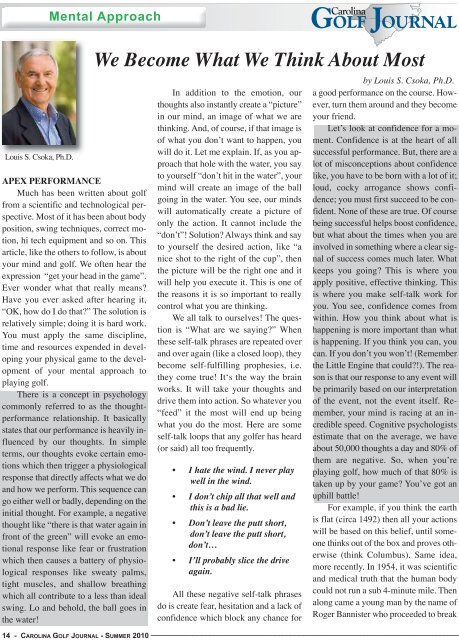Rory McIlroy's Miracle Mile - Play Best Golf Courses in Charlotte, NC
Rory McIlroy's Miracle Mile - Play Best Golf Courses in Charlotte, NC
Rory McIlroy's Miracle Mile - Play Best Golf Courses in Charlotte, NC
Create successful ePaper yourself
Turn your PDF publications into a flip-book with our unique Google optimized e-Paper software.
Mental ApproachLouis S. Csoka, Ph.D.APEX PERFORMA<strong>NC</strong>EMuch has been written about golffrom a scientific and technological perspective.Most of it has been about bodyposition, sw<strong>in</strong>g techniques, correct motion,hi tech equipment and so on. Thisarticle, like the others to follow, is aboutyour m<strong>in</strong>d and golf. We often hear theexpression “get your head <strong>in</strong> the game”.Ever wonder what that really means?Have you ever asked after hear<strong>in</strong>g it,“OK, how do I do that?” The solution isrelatively simple; do<strong>in</strong>g it is hard work.You must apply the same discipl<strong>in</strong>e,time and resources expended <strong>in</strong> develop<strong>in</strong>gyour physical game to the developmentof your mental approach toplay<strong>in</strong>g golf.There is a concept <strong>in</strong> psychologycommonly referred to as the thoughtperformancerelationship. It basicallystates that our performance is heavily <strong>in</strong>fluencedby our thoughts. In simpleterms, our thoughts evoke certa<strong>in</strong> emotionswhich then trigger a physiologicalresponse that directly affects what we doand how we perform. This sequence cango either well or badly, depend<strong>in</strong>g on the<strong>in</strong>itial thought. For example, a negativethought like “there is that water aga<strong>in</strong> <strong>in</strong>front of the green” will evoke an emotionalresponse like fear or frustrationwhich then causes a battery of physiologicalresponses like sweaty palms,tight muscles, and shallow breath<strong>in</strong>gwhich all contribute to a less than idealsw<strong>in</strong>g. Lo and behold, the ball goes <strong>in</strong>the water!We Become What We Th<strong>in</strong>k About MostIn addition to the emotion, ourthoughts also <strong>in</strong>stantly create a “picture”<strong>in</strong> our m<strong>in</strong>d, an image of what we areth<strong>in</strong>k<strong>in</strong>g. And, of course, if that image isof what you don’t want to happen, youwill do it. Let me expla<strong>in</strong>. If, as you approachthat hole with the water, you sayto yourself “don’t hit <strong>in</strong> the water”, yourm<strong>in</strong>d will create an image of the ballgo<strong>in</strong>g <strong>in</strong> the water. You see, our m<strong>in</strong>dswill automatically create a picture ofonly the action. It cannot <strong>in</strong>clude the“don’t”! Solution? Always th<strong>in</strong>k and sayto yourself the desired action, like “anice shot to the right of the cup”, thenthe picture will be the right one and itwill help you execute it. This is one ofthe reasons it is so important to reallycontrol what you are th<strong>in</strong>k<strong>in</strong>g.We all talk to ourselves! The questionis “What are we say<strong>in</strong>g?” Whenthese self-talk phrases are repeated overand over aga<strong>in</strong> (like a closed loop), theybecome self-fulfill<strong>in</strong>g prophesies, i.e.they come true! It‘s the way the bra<strong>in</strong>works. It will take your thoughts anddrive them <strong>in</strong>to action. So whatever you“feed” it the most will end up be<strong>in</strong>gwhat you do the most. Here are someself-talk loops that any golfer has heard(or said) all too frequently.• I hate the w<strong>in</strong>d. I never playwell <strong>in</strong> the w<strong>in</strong>d.• I don’t chip all that well andthis is a bad lie.• Don’t leave the putt short,don’t leave the putt short,don’t…• I’ll probably slice the driveaga<strong>in</strong>.All these negative self-talk phrasesdo is create fear, hesitation and a lack ofconfidence which block any chance forby Louis S. Csoka, Ph.D.a good performance on the course. However,turn them around and they becomeyour friend.Let’s look at confidence for a moment.Confidence is at the heart of allsuccessful performance. But, there are alot of misconceptions about confidencelike, you have to be born with a lot of it;loud, cocky arrogance shows confidence;you must first succeed to be confident.None of these are true. Of coursebe<strong>in</strong>g successful helps boost confidence,but what about the times when you are<strong>in</strong>volved <strong>in</strong> someth<strong>in</strong>g where a clear signalof success comes much later. Whatkeeps you go<strong>in</strong>g? This is where youapply positive, effective th<strong>in</strong>k<strong>in</strong>g. Thisis where you make self-talk work foryou. You see, confidence comes fromwith<strong>in</strong>. How you th<strong>in</strong>k about what ishappen<strong>in</strong>g is more important than whatis happen<strong>in</strong>g. If you th<strong>in</strong>k you can, youcan. If you don’t you won’t! (Rememberthe Little Eng<strong>in</strong>e that could?!). The reasonis that our response to any event willbe primarily based on our <strong>in</strong>terpretationof the event, not the event itself. Remember,your m<strong>in</strong>d is rac<strong>in</strong>g at an <strong>in</strong>crediblespeed. Cognitive psychologistsestimate that on the average, we haveabout 50,000 thoughts a day and 80% ofthem are negative. So, when you’replay<strong>in</strong>g golf, how much of that 80% istaken up by your game? You’ve got anuphill battle!For example, if you th<strong>in</strong>k the earthis flat (circa 1492) then all your actionswill be based on this belief, until someoneth<strong>in</strong>ks out of the box and proves otherwise(th<strong>in</strong>k Columbus). Same idea,more recently. In 1954, it was scientificand medical truth that the human bodycould not run a sub 4-m<strong>in</strong>ute mile. Thenalong came a young man by the name ofRoger Bannister who proceeded to break14 - CAROLINA GOLF JOURNAL - SUMMER 2010 _____________________________________________________________________________









